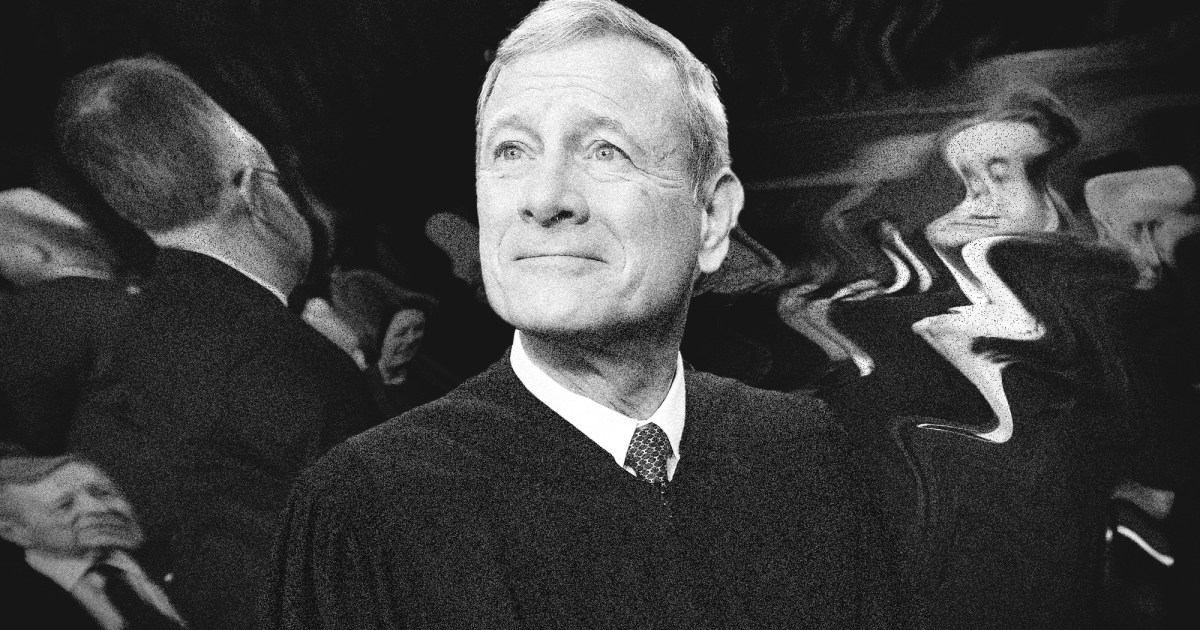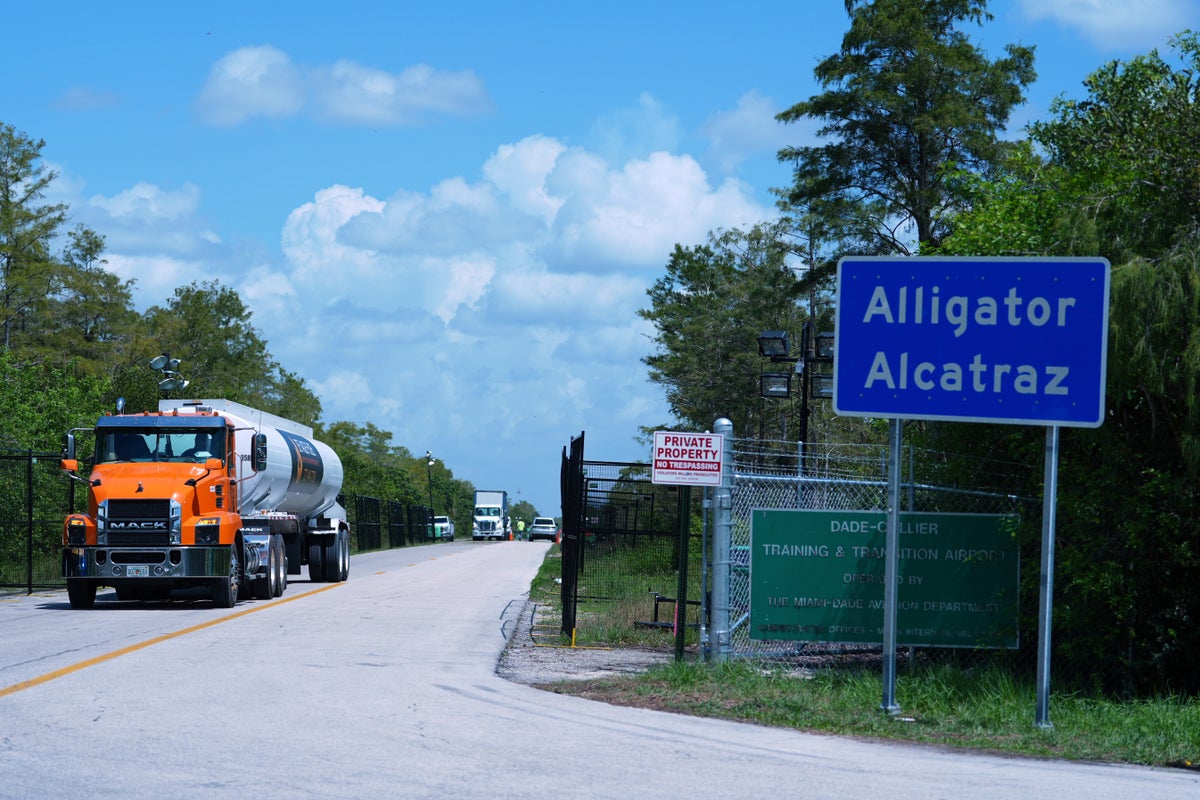Chief Justice John Roberts has led the Supreme Court for 20 years now. In that time, his Republican-appointed majority has completely transformed America and its politics, with many of its most destructive opinions written by Roberts himself. Some effects are already visible in our everyday lives, others are only now coming into focus.
“This is now a MAGA court, and Roberts is at the helm.”
The court has rolled back voting rights and greenlit gerrymandering, at particular costs to nonwhite voters. It has allowed unlimited money to warp our politics and empowered the wealthiest elites at the expense of most Americans—a distortion that is reflected in growing inequality. The court ended affirmative action in higher education. It ended the right to an abortion. It made it harder for the government to issue the kinds of rules and regulations that safeguard our health and environment. It so aggressively expanded gun rights that virtually every American is now essentially entitled to a machine gun. It’s consistently weakened labor unions and consumer rights. The court has eviscerated the separation of church and state by inviting religious activities and opinions into public schools. And after significant wins for LGBTQ rights—over Roberts’ objection—the court has pivoted and begun to attack them, and transgender people in particular. It’s made public corruption great again. And then there is the court’s obsessive drive to increase presidential power, culminating in last year’s immunity decision, written by Roberts, in which the court granted the president sweeping new powers and general immunity from criminal prosecution, upsetting the separation of powers in our system of government. The decision was the most radical one in a series of holdings where, leading up to the 2024 election, the court repeatedly stepped in to help Trump escape accountability for alleged crimes and aid his return to power. Finally, in recent months, the court has unleashed Trump to act illegally by halting lower court injunctions—decisions which have resulted in illegal deportations to South Sudan, racial profiling by ICE, and the partial dismantling of multiple federal agencies, to name a few. In the face of district courts reining in Trump, the justices decided to strip lower court judges of their power to issue nationwide relief.
That’s quite a record.
Lisa Graves saw it coming. As chief nominations counsel to Sen. Patrick Leahy, when President George W. Bush first nominated Roberts to a seat on the federal bench, she believed Roberts had been selected by monied rightwing interests to rise the ranks and lead a conservative revolution on the Supreme Court. In her subsequent years as a researcher, she has sought to uncover the billionaire funding networks behind the hijacking of the court. This month, she published a book, Without Precedent, that lays out not just the damage wrought by the Roberts court, but also the behind-the-scenes machinations that created it. The details and context Graves provides—both as a witness and a player in nomination fights, and a researcher working with reporters—combine to capture the movement to overtake the court with a wide aperture. Did you know, for example, that the parents of C. Boyden Gray, a Republican kingmaker and key Roberts backer, celebrated their upcoming wedding with a party in which some guests dressed as Nazis? I didn’t.
To Graves, the Roberts court is the right’s answer to the Warren court, which in the 1950s and 1960s issued a long list of opinions that expanded individual rights and promoted racial equality. Conservatives wanted to undo that progress, but their mission to take over the court sometimes hit roadblocks. In 1987, President Ronald Reagan tapped Robert Bork, but his reactionary views on civil rights sank his nomination. In 1990, President George W. Bush nominated David Souter, who would go on to vote with the liberal wing of the court. Rightwing interests, whose power was channeled largely through the Federalist Society’s Leonard Leo, redoubled their efforts. This meant firstly, no more Souters. Second, it meant ensuring none of their nominees could get “Borked.” Graves account of the Roberts court is as much a story of Roberts as it is the people, like Leo, who spent fortunes orchestrating this campaign.
“No Supreme Court majority in American history has ever been constructed the way the Roberts court has—with the help of big, dark secret money,” Graves writes. “The Roberts faction dominating the Supreme Court is quite the cast of characters. Each of them was carefully selected not because they were thought to be fair but because they were believed to be dependable votes for a revolution in the law—one Leo and his cohorts knew could be accomplished only by keeping Americans in the dark about their views.” They have succeeded, perhaps beyond their wildest dreams.
Lisa Graves leads the judicial watchdog group True North Research, is a frequent guest on MSNBC, and sits on several non-profit boards—including the Park Foundation, which has supported Mother Jones. I spoke with Graves about her book, her thoughts on Roberts’ legacy, and where the country goes from here.
You finished the book earlier this year, but events are moving at warp speed with this Supreme Court. Have your thoughts on the chief justice evolved in the last few months as the court hands Trump win after win? Or is the John Roberts that you document over decades the same John Roberts that you see all the way through?
The court’s aggressive action to overturn numerous temporary restraining orders by lower court judges—and to do so using the emergency docket this summer—just the amount of those interventions and disregard for the detailed findings of lower court judges, exceeded my worst fears. But we’re not done yet, and there’s more damage that this Court will do. I do think that that is in many ways very consistent with the through line of who Roberts is and was at the time of his confirmation.
One of the stories in the book is about how he was auditioning for the job on the Supreme Court, secretly interviewing with the Bush administration, as the Bush administration was litigating a case before him. The Bush administration was asserting that the president had the power to reinterpret the Geneva Conventions and subject [Salim Hamdan] to these military tribunals that Bush and [Vice President Dick] Cheney constructed. Roberts never told Hamdan’s lawyers that he was seeking a job from the administration while that case was pending. Had he recused himself, he might not have gotten the job. Had he ruled against them, he might not have gotten the job. The facts are that he interviewed with the Bush administration, with top officials, for more than 100 days while that case was pending. He joined the decision ruling in favor of [the Bush administration], and two days later, he was nominated for the Supreme Court. He interviewed with Bush basically as that decision had come down.
One of his first acts in getting power was to accept a very aggressive assertion of executive branch power, and he did so while he was trying to get a job from that president. So in that sense it’s not a surprise to me that we’re here now, where he is basically using the power of the court, along with his fellow Republican appointees, to expand the power of a Republican President.
Your research has focused a lot on the shadowy network of billionaires behind the conservative legal movement. When we think about the court’s entanglements with billionaires, we generally think of Clarence Thomas, or even Samuel Alito. Can you explain Roberts’ relationship with the moneyed interests that support the Federalist Society and a lot of the agenda that he’s implemented?
I observed that firsthand when I was the chief counsel for nominations for the Senate Judiciary Committee for Senator Leahy. Roberts was one of just over a dozen people who were nominated by George W. Bush on May 9, 2001, putting people in place for potential Supreme Court vacancies. [Roberts was nominated to the DC Circuit Court of Appeals.] We were not going to move him forward to a hearing or a vote. And the right wing groups were enraged. They started spending a lot of money to try to pressure Democrats to approve Roberts. He was almost always at the top of their talking points; he was their top horse in the race. That was Leonard Leo. It was C. Boyden Gray and some right wing groups actively pushing for Roberts’ confirmation.
“It’s so damaging, it’s so destructive—and he orchestrated it.”
Then, when he was nominated to the Supreme Court in 2005, those groups went into overdrive. There’s very little known about some of the donors to some of those groups. But we know, for example, that Charles Koch supported Roberts and Alito. He’s been a long-standing funder of the Federalist Society. And Leo was described in internal documents that were released as part of the [Brett] Kavanaugh Supreme Court nomination as leading the umbrella group that was marshaling and managing the confirmation process for Roberts to the DC Circuit and and then to help ensure that they got their guy on the Supreme Court.
To crystallize it, Roberts is really the beneficiary of the first billionaire-backed campaign to capture the US Supreme Court. And as the Chief Justice, he’s used the power of that court to advance an agenda that has been aligned with the regressive agenda of those billionaires that are funding the right’s legal movement that Leonard Leo has helped helm.
If you look at what big business interests want, that’s the result that Roberts votes for. And at this point, what the court votes for.
There’s statistics showing that he almost never rules against the Chamber [of Commerce].
Looking forward, the upcoming tariffs case and also the case over the firing of Federal Reserve Governor Lisa Cook feature clashes between the Leonard Leo side of the conservative legal movement and the MAGA side. Leo and Koch have both funded the group challenging Trump’s tariffs. A prominent Republican lawyer is on the brief opposing Lisa Cook’s removal. But Trump thinks he should be able to do whatever he wants, even if it’s taking over monetary policy, and using tariffs to destroy the economy. What do you think of Roberts’ predicament in these cases?
The immunity decision signaled that Roberts has moved more into MAGA land. He has really taken the driver’s wheel in terms of embracing a MAGA agenda, and that’s reflected in the January 6 trio of cases last year, and in particular the unprecedented immunity decision, and is reflected in the rulings this year, these emergency rulings. He is embracing the White House’s position on immigration in a way that is not consistent with most of the business community that does not support these sort of aggressive attacks on immigration and our employment systems.
Let me ask about the immunity decision, Trump v. United States, because I was surprised that they granted presidents immunity from criminal prosecution—and then how far it went beyond that. The more I learn about the opinion, the more extreme it is. How does Trump v. United States fit into Robert’s career? Does it stand out in a way that seems radical even for him?
At his confirmation hearings, he affirmed that no president is above the law, no one is above the law. And then when it mattered most for him to stand for that principle, he not only abandoned it, he aggressively wrote this very expansive opinion, ignoring the language of the Constitution that says in two places, the job of the president is to faithfully execute the law. And nothing could be less faithful than breaking the law.
When Richard Nixon asserted that ‘When the President does it, it’s by definition legal,’ no reasonable person accepted that assertion. It was the assertion of a crook. And here we are, almost 50 years since that outlandish claim by Nixon, with a court that has embraced it as a matter of law to say that if the President says that something is part of his so-called official acts, that he cannot be held accountable in a court of law. That ruling broke a key component of our democratic republic, which is that no president is above the law. It’s so damaging, it’s so destructive, and he orchestrated it. Now, why did he do this?
“Roberts has moved more into MAGA land.”
This is now a MAGA court, and Roberts is at the helm of it, and he is helping to drive this agenda that is aiding Trump and emboldening Trump at every turn. The cynical view of that would be this notion that there will be no accountability, because once Trump and the Republicans consolidate the levers of power, they will never let them go. That is the worry that I think a lot of people have. So they’re consequence-free in the sense of not having to face an impeachment or reforms in Congress. That’s sort of the cynical view. And I can’t say that it’s an irrational view.
We are in a whole new territory because of this Supreme Court basically paving the way for Trump’s return by blocking the trials of Trump, signaling to some subset of the American people that those charges were illegitimate when they were well-grounded in the law. And signaling to Trump and some of his followers that he could do no wrong, that he could not violate the law, or going forward, that he, as President, has vast powers.
You predict in the book that Roberts will go down as the worst chief justice in American history. That seems bold, maybe less bold by the day. But Roger Taney wrote Dred Scott and might have caused a Civil War. What is your pitch for why you think that you’ll be proven right?
I didn’t make that observation lightly, knowing how Roger Taney’s inflammatory, outlandish, outrageous ruling helped precipitate the Civil War. What John Roberts has been orchestrating, in particular with the immunity ruling, and then the actions this year, along with the Citizen United decision [on political spending], the Shelby County decision limiting the Voting Rights Act, the Rucho case on the [political] maps, the South Carolina case [on racial gerrymandering], Brnovich [on voting rights], I think that Roberts will go down in history as the most destructive chief justice when it comes to the rights of Americans in our democracy, to participate in our democracy, to have a fair and representative democracy. And the ruling he orchestrated for Trump in the immunity case will threaten whether our democracy will continue to exist.














